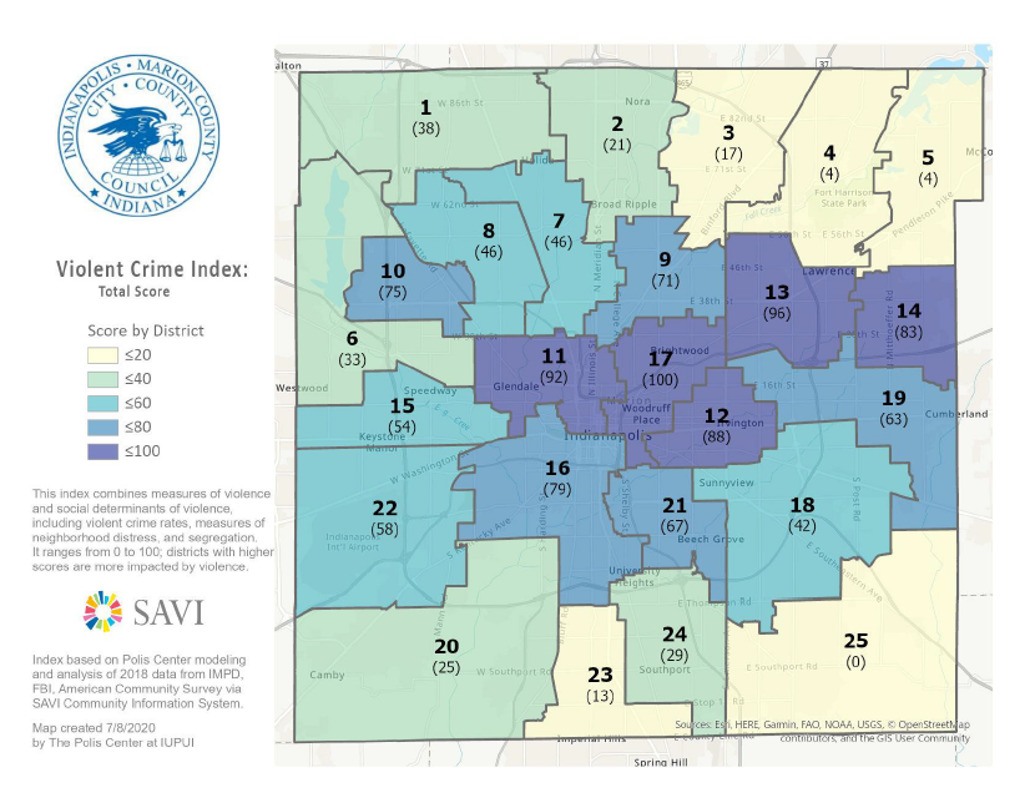In response to the impact of crime and inequitable access to opportunity in Marion County neighborhoods and communities, the Indianapolis Marion County City-County Council has created the Council District Crime Prevention Grants Program.
This new program administered by The Indianapolis Foundation, an affiliate of CICF, will support new or existing projects, services, and programs that show potential to reduce crime in Marion County—either directly or indirectly.
The grant program will align with each councilmember’s priorities for their district and CICF’s mission of equity. Grantmaking will prioritize resident-driven, grassroots, and nontraditional neighborhood-based organizations that serve under-appreciated neighborhoods and/or communities of color with accessible programs that empower neighborhoods to build a safer community
Lea esta información y solicitud en español.
GrantMAKING
Who can apply?
- Priority given to resident-driven, grassroots, and nontraditional neighborhood-based organizations
- Registered 501(c)(3) organizations
- Organizations and/or individuals who have partnered with a registered not-for-profit fiscal agent
- One application per organization may be submitted
learn more at the upcoming grantmaking info session on Saturday, Sept 18
Grants award range from $500 to $40,000
Focus on efforts including but not limited to:
- providing supportive services to youth and adults who face unique challenges and may have a higher likelihood of neighborhood segregation without proper intervention services (such as employment, education, mentoring, recreation, and family support services)
- designing programs to reduce or prevent crime in a specific geographical area as defined by a neighborhood (place-based approach)
- supporting youth and adults currently interacting with the criminal legal system to reduce recidivism
Grant Round |
Applications Open |
Applications Deadline |
Award Notification |
Grant report due |
| Round Two | Sept. 1, 2021 | Oct. 22, 2021 at 3 p.m. |
Dec. 15, 2021 | March 1, 2022 |
Tiers & Priorities for each district

Identify your councilmember by address
TIER 1 – $40K per district
DISTRICT |
COUNCILPERSON |
PRIORITIES |
| 11 | Vop Osili |
|
| 12 | Jason Larrison |
|
| 13 | Keith L. Graves |
|
| 14 | La Keisha Jackson |
|
| 17 | Zach Adamson |
|
TIER 2 – $32.5K per district
DISTRICT |
COUNCILPERSON |
PRIORITIES |
| 9 | William Oliver |
|
| 10 | Maggie A. Lewis |
|
| 16 | Kristin Jones |
|
| 19 | David Ray |
|
| 21 | Frank Mascari |
|
TIER 3 – $25K per district
DISTRICT |
COUNCILPERSON |
PRIORITIES |
| 7 | John Barth |
|
| 8 | Monroe Gray, Jr |
|
| 15 | Jessica McCormick |
|
| 18 | Paul Hart |
|
| 22 | Jared Evans |
|
TIER 4 – $17.5K per district
DISTRICT |
COUNCILPERSON |
PRIORITIES |
| 1 | Leroy Robinson |
|
| 2 | Keith Potts |
|
| 6 | Crista Carlino |
|
| 20 | Joshua Bain |
|
| 24 | Michael Dilk |
|
TIER 5 – $10K per district
DISTRICT |
COUNCILPERSON |
PRIORITIES |
| 3 | Dan Boots |
|
| 4 | Ethan Evans |
|
| 5 | Alison “Ali” Brown |
|
| 23 | Paul Annee |
|
| 25 | Brian Mowery |
|
for more information about each district, view the dashboards provided by SAVI
What The Council District Crime Prevention Grants Program Does Not Fund
- requests for projects outside of the listed priorities of the selected district
- funds that support government agencies and/or replace government services
- direct awards to individuals (Projects led by individuals are required to have a not-for-profit fiscal agent in place for the management of grant funds and reporting requirements.)
- requests that do not primarily support marginalized youth and/or adults
- projects aimed at promoting a particular religion or construction projects for religious institutions
- operating, program and construction costs for schools, universities and private academies unless there is a significant opportunity for community use or collaboration
- organizations or projects that discriminate based upon race, ethnicity, age, gender or sexual orientation
- political campaigns or direct lobbying efforts by 501(c)(3) organizations
- post-events, after-the-fact situations or debt retirement
- medical, scientific or academic research
- publications, films, audiovisual and media materials, programs produced for artistic purposes or produced for resale
- travel for bands, sports teams, classes and similar groups
- annual appeals, galas or membership contributions
- fundraising events such as golf tournaments, walk-a-thons and fashion shows
Reporting
All grant recipients will be required to submit a formal report to CICF upon completion of the grant and made available to City-County Council for review. Grant reports may be submitted upon the exhaustion of funds and no later than six months from the date the grant was paid.
Access the report here. If awarded, please download and complete the report form provided.
SUBMIT your application BY 3 p.m. on Oct. 22, 2021
This form is currently closed for submissions.




